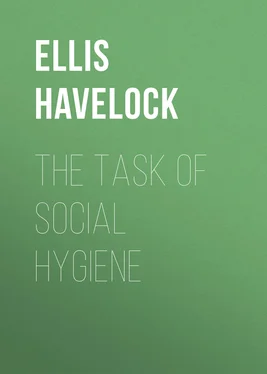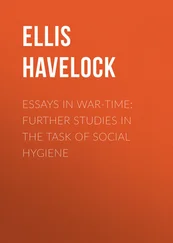Havelock Ellis - The Task of Social Hygiene
Здесь есть возможность читать онлайн «Havelock Ellis - The Task of Social Hygiene» — ознакомительный отрывок электронной книги совершенно бесплатно, а после прочтения отрывка купить полную версию. В некоторых случаях можно слушать аудио, скачать через торрент в формате fb2 и присутствует краткое содержание. Жанр: psy_sex_and_family, foreign_psychology, foreign_edu, на английском языке. Описание произведения, (предисловие) а так же отзывы посетителей доступны на портале библиотеки ЛибКат.
- Название:The Task of Social Hygiene
- Автор:
- Жанр:
- Год:неизвестен
- ISBN:нет данных
- Рейтинг книги:5 / 5. Голосов: 1
-
Избранное:Добавить в избранное
- Отзывы:
-
Ваша оценка:
- 100
- 1
- 2
- 3
- 4
- 5
The Task of Social Hygiene: краткое содержание, описание и аннотация
Предлагаем к чтению аннотацию, описание, краткое содержание или предисловие (зависит от того, что написал сам автор книги «The Task of Social Hygiene»). Если вы не нашли необходимую информацию о книге — напишите в комментариях, мы постараемся отыскать её.
The Task of Social Hygiene — читать онлайн ознакомительный отрывок
Ниже представлен текст книги, разбитый по страницам. Система сохранения места последней прочитанной страницы, позволяет с удобством читать онлайн бесплатно книгу «The Task of Social Hygiene», без необходимости каждый раз заново искать на чём Вы остановились. Поставьте закладку, и сможете в любой момент перейти на страницу, на которой закончили чтение.
Интервал:
Закладка:
During the past ten years the movement of social reform has entered a fourth stage. The care of the child during his school-days was seen to be insufficient; it began too late, when probably the child's fate for life was already decided. It was necessary to push the process further back, to birth and even to the stage before birth, by directing social care to the infant, and by taking thought of the mother. This consideration has led to a whole series of highly important and fruitful measures which are only beginning to develop, although they have already proved very beneficial. The immediate notification to the authorities of a child's birth, and the institution of Health Visitors to ascertain what is being done for the infant's well-being, and to aid the mother with advice, have certainly been a large factor in the recent reduction in the infantile death-rate in England. 3 3 The rate of infant mortality in England and Wales has decreased from 149 per 1000 births in 1871-80 to 127 per 1000 births in 1910. In reference to this remarkable fall which has taken place pari passu with the fall in the birth-rate, Newsholme, the medical officer to the Local Government Board, writes: "There can be no reasonable doubt that much of the reduction has been caused by that 'concentration' on the mother and the child which has been a striking feature of the last few years. Had the experience of 1896-1900 held good there would have been 45,120 more deaths of infants in 1910 than actually occurred." In some parts of the country, however, where the women go out to work in factories (as in Lancashire and parts of Staffordshire) the infantile mortality remains very high.
The care of the infant has indeed now become a new applied science, the science of puericulture. Professor Budin of Paris may fairly be regarded as the founder of puericulture by the establishment in Paris, in 1892, of Infant Consultations, to which mothers were encouraged to bring their babies to be weighed and examined, any necessary advice being given regarding the care of the baby. The mothers are persuaded to suckle their infants if possible, and if their own health permits. For the cases in which suckling is undesirable or impossible, Budin established Milk Depôts, where pure milk is supplied at a low price or freely. Infant Consultations and Milk Depôts are now becoming common everywhere. A little later than Budin, another distinguished French physician, Pinard, carried puericulture a step further back, but a very important step, by initiating a movement for the care of the pregnant woman. Pinard and his pupils have shown by a number of detailed investigations that the children born to working mothers who rest during the last three months of pregnancy, are to a marked extent larger and finer than the children of those mothers who enjoy no such period of rest, even though the mothers themselves may be equally robust and healthy in both cases. Moreover, it is found that premature birth, one of the commonest accidents of modern life, tends to be prevented by such rest. The children of mothers who rest enjoy on the average three weeks longer development in the womb than the children of the mothers who do not rest, and this prolonged ante-natal development cannot fail to be a benefit for the whole of the child's subsequent life. The movement started by Pinard, though strictly a continuation of the great movement for the improvement of the conditions of life, takes us as far back as we are able to go on these lines, and has in it the promise of an immense benefit to human efficiency.
In connection with the movement of puericulture initiated by Budin and Pinard must be mentioned the institution of Schools for Mothers, for it is closely associated with the aims of puericulture. The School for Mothers arose in Belgium, a little later than the activities of Budin and Pinard commenced. About 1900 a young Socialist doctor of Ghent, Dr. Miele, started the first school of this kind, with girls of from twelve to sixteen years of age as students and assistants. The School eventually included as many as twelve different services, among these being dispensaries for mothers, a mothers' friendly society, milk depôts both for babies and nursing mothers, health talks to mothers with demonstrations, courses on puericulture (including anatomy, physiology, preparation of foods, weighing, etc.) to girls between fourteen and eighteen, who afterwards become eligible for appointment as paid assistants. 4 4 Mrs. Bertrand Russell, "The Ghent School for Mothers," Nineteenth Century , December, 1906.
In 1907 Schools for Mothers were introduced into England, at first under the auspices of Dr. Sykes, Medical Officer of Health for St. Pancras, London. Such Schools are now spreading everywhere. In the end they will probably be considered necessary centres for any national system of puericulture. Every girl at the end of her school life should be expected to pass through a certain course of training at a School for Mothers. It would be the technical school for the working-class mother, while such a course would be invaluable for any girl, whatever her social class, even if she is never called to be a mother herself or to have the care of children.
The great movement of social reform during the nineteenth century, we thus see, has moved in four stages, each of which has reinforced rather than replaced that which went before: (1) the effort to cleanse the gross filth of cities and to remedy obvious disorder by systematic attention to scavenging, drainage, the supply of water and of artificial light, as well as by improved policing; (2) the great system of factory legislation for regulating the conditions of work, and to some extent restraining the work of women and of children; (3) the introduction of national systems of education, and the gradual extension of the idea of education to cover far more than mere instruction; and (4), most fundamental of all and last to appear, the effort to guard the child before the school age, even at birth, even before birth, by bestowing due care on the future mother. 5 5 It is scarcely necessary to say that other classifications of social reform on its more hygienic side may be put forward. Thus W.H. Allen, looking more narrowly at the sanitary side of the matter, but without confining his consideration to the nineteenth century, finds that there are always seven stages: (1) that of racial tutelage, when sanitation becomes conscious and receives the sanction of law; (2) the introduction of sanitary comfort, well-paved streets, public sewers, extensive waterworks; (3) the period of commercial sanitation, when the mercantile classes insist upon such measures as quarantine and street-cleaning to check the immense ravages of epidemics; (4) the introduction of legislation against nuisances and the tendency to extend the definition of nuisance, which for Bracton, in the fourteenth century, meant an obstruction, and for Blackstone, in the eighteenth, included things otherwise obnoxious, such as offensive trades and foul watercourses; (5) the stage of precaution against the dangers incidental to the slums that are fostered by modern conditions of industry; (6) the stage of philanthropy, erecting hospitals, model tenements, schools, etc.; (7) the stage of socialistic sanitation, when the community as a whole actively seeks its own sanitary welfare, and devotes public funds to this end. (W.H. Allen, "Sanitation and Social Progress," American Journal of Sociology , March, 1903.)
It may be pointed out that this movement of practical social reform has been accompanied, stimulated, and guided by a corresponding movement in the sciences which in their application are indispensable to the progress of civilized social reform. There has been a process of mutual action and reaction between science and practice. The social movement has stimulated the development of abstract science, and the new progress in science has enabled further advances to be made in social practice. The era of expansion in sanitation was the era of development in chemistry and physics, which alone enabled a sound system of sanitation to be developed. The fight against disease would have been impossible but for bacteriology. The new care for human life, and for the protection of its source, is associated with fresh developments of biological science. Sociological observations and speculation, including economics, are intimately connected with the efforts of social reform to attain a broad, sound, and truly democratic basis. 6 6 Dr. F. Bushee has pointed out ("Science and Social Progress," Popular Science Monthly , September, 1911) that there is a kind of related progression between science and practice in this matter: "The natural sciences developed first, because man was first interested in the conquest of nature, and the simpler physical laws could be grasped at an early period. This period brought an increase of wealth, but it was wasteful of human life. The desire to save life led the way to the study of biology. Knowledge of the physical environment and of life, however, did not prevent social disease from flourishing, and did not greatly improve the social condition of a large part of society. To overcome these defects the social sciences within recent years have been cultivated with great seriousness. Interest in the social sciences has had to wait for the enlarged sympathies and the sense of solidarity which has appeared with the growing interdependence of dense populations, and these conditions have been dependent upon the advance of the other sciences. With the cultivation of the social sciences, the chain of knowledge will be complete, at least so far as the needs which have already appeared are concerned. For each group of sciences will solve one or more of the great problems which man has encountered in the process of development. The physical sciences will solve the problems of environment, the biological sciences the problems of life, and the social sciences the problems of society."
Интервал:
Закладка:
Похожие книги на «The Task of Social Hygiene»
Представляем Вашему вниманию похожие книги на «The Task of Social Hygiene» списком для выбора. Мы отобрали схожую по названию и смыслу литературу в надежде предоставить читателям больше вариантов отыскать новые, интересные, ещё непрочитанные произведения.
Обсуждение, отзывы о книге «The Task of Social Hygiene» и просто собственные мнения читателей. Оставьте ваши комментарии, напишите, что Вы думаете о произведении, его смысле или главных героях. Укажите что конкретно понравилось, а что нет, и почему Вы так считаете.












